Audio Autopsy, 1980: David Valentine & R.A.F. LP, A&M Records: Chops to Woo Hit Radio, Who Couldn't Care Less
They combined Stygian dynamism with Foreigner's radio-friendly sheen. With David Kershenbaum's crafty, '80s-era new wavey production and Valentine's classic pop songwriting chops, what could go wrong?
“We model ourselves after the classic American rock and roll sounds of bands like Boston, Foreigner, and Steely Dan,” co-founder of R.A.F., guitarist Doug Bogie, said in the band’s official A&M Records bio back in 1981.
So, right up front, R.A.F. was clear and bold in declaring their goal of being radio-friendly and familiar. The challenge was avoiding the trap of being derivative and/or annoyingly repetitive. Thankfully, their creativity wouldn’t let that happen.
The originality of chief songwriter, David Valentine, plus the keen ear of producer/arranger, David Kershenbaum, helped keep R.A.F. flying on course, niftily avoiding the temptation of purely aping the radio sounds of 1980, while cleverly employing catchy melodies, layered harmonies, and top-notch production values enjoyed by the million-selling acts Bogie name-dropped 41 years ago.
As their bio so optimistically put it: “They’re familiar enough to be immediately accepted by rock fans, yet different enough to stand out.”
R.A.F., Initially
Originally formed in Scotland, David Valentine (vocals, keyboards), a veteran of Edinburgh’s beat group scene, was supplementing his nightly pub singing with writing commercial radio jingles. It’s there where he met budding British producer, Doug Bogie (guitar), who had moved to Edinburgh in the early ‘70s.
The nucleus of R.A.F. formed in early ‘78, and after being summarily snubbed by nearly all the London-based record labels, they ponied up enough dough to wing to the West Coast, armed with their set of superior demos.
One of their first stops was the old Chaplin movie lot just behind the Safeway at the corner of Sunset and La Brea. Since 1966, it had been the home to A&M Records.
Their self-produced demos won them their contract, and it was David Kershenbaum, then Veep of A&R at A&M, who not only signed them, but had them fly to London shortly thereafter, where their sessions began. Kershenbaum, as producer, proved to be R.A.F.’s secret weapon.
Billy McGhee (bass) and Tom Annan (percussion) completed the band’s featured line-up after completion of the album’s recording. Peter-John Vettese on keyboards and vocals was also added. The three had been Scottish bar band veterans for years.
The Kershenbaum Effect
Kershenbaum (who has also produced albums by Peter Frampton, Supertramp, Cat Stevens, and Joe Jackson, among many others) and his particular style of knob-twisting provides the unique sonic punctuations to David Valentine’s catchier-than-they-have-a-right-to-be songs.
Thankfully, though, Kershenbaum (who collaborated with the band on arrangements) helped keep R.A.F. in a clean dynamic zone, putting up the guardrails to make sure they avoided out’n’out cluttered bombast, an element that (arguably) weighed down many a Queen/Roy Thomas Baker effort.
In fact, Kershenbaum, shortly after the album’s release, described the R.A.F. sound as “melodic with a hard edge based around keyboards.”
[Editor’s Note: Regular readers of Front Row & Backstage will recognize the name, David Kershenbaum, as it was fledgling producer David who produced FR&B’s own Stephen Michael Schwartz’s debut LP for RCA Records in 1974. That album’s “Audio Autopsy” can be accessed here, highlighted by our ongoing exclusive interview with Stephen]:
Released in a Crowded Year of Legendary Vinyl
In 1980, when the self-titled R.A.F. debut was released worldwide on A&M Records, I was working retail as assistant manager of the Glendale (L.A. County) Music Plus, a leading Southern California record store chain.
I took a promo copy home, and it managed to find its way onto my turntable more and more times. Tight, well-crafted tunes (with well-defined, ear-worm choruses) mixed with stacked, multi-harmony vocals made for an arresting listen.
And, this in a year that was busy with soon-to-be career-defining rock classics, like AC/DC’s Back in Black, Bowie’s Scary Monsters, Springsteen’s The River, Clash’s Sandinista, U2’s Boy, Rush’s Permanent Waves, and an avalanche of others.
Tonearm to Platter
David Valentine provides lead vocals and keyboards, and was R.A.F.’s main songwriter. Joining him was Doug Bogie on guitar. The two played all the instruments on the album, with Annan sitting in on several tracks on drums.
“Sweet Melinda” introduces us to R.A.F., and is certainly serviceable as an upbeat opener, with a bouncy synth figure befitting Devo of the day, and a searing Bogie guitar solo.
It’s also here where we see what we’re in for with our first exposure to the band’s trademark 3-part harmony chorus, making “Sweet Melinda” ever so radio friendly, even as it is repeated into the fade-out.
“Give Me a Little Time”
But, it’s track #2 that caught my ear back in 1980, and should have not only been a single, but been a hit: “Give Me a Little Time.”
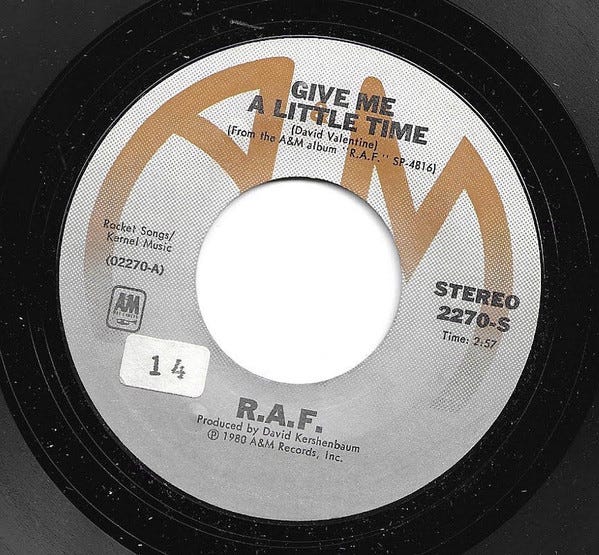
It lulls you with a false sense of angelic balladry at the start, before exploding into a rollercoaster of sonic wonderment, with sudden tempo changes, flanging (phasing) effects (Kershenbaum’s knob-twiddling in action!), sax figures (a year before Junior Walker’s iconic sax break on Foreigner’s “Urgent”) and guitar solos swirling within…and, of course, those vocals:
I seem to recall being so stricken with the song, that I played it over several times before allowing the tonearm to make its inevitable rendezvous with Side 1’s label!
Once it did, Side 2 begins with another gripping track, “Change Your Ways,” which, again, features a somewhat “busy” arrangement, but all elements exist to enhance, not belabor or drag it down under its own instrumental weight, as it so easily could have:
“More Crazy Now” seems to marry a classic Supertramp-y vibe with “Love is Like Oxygen”-era Sweet. Again, dynamics (and Valentine’s pounding piano, with brilliant glissando into the chorus) rule the day, but a stadium-stompin’ KISS-like chorus seems to scream for the radio hit that forever eluded them.
As for the lyrics, David clearly gets it…the uphill battle that bands like R.A.F., with clever, catchy, and original-sounding music, have in breaking through the “Muzak gods” incessant dreck served over the airwaves-“It’s a mad affair, I’m sick and tired of hearing the same things; I think I’m going out of my mind.”
Clearly, R.A.F. was founded for those who have flung (or ever wanted to fling) their transistors against the wall…hard.:
R.A.F. probably pulled off the hardest thing to do in pop music: Sound pleasingly familiar, without lapsing into sounding cloyingly derivative. No song on the album comes closest to toeing that line so successfully as “She Used to Be Mine,” and no song on the album sounds so radio-ready!
They even boldly employ a Phil Spector/Hal Blaine/”Be My Baby” drum signature at the beginning and throughout the verses, before galloping into a sing-along chorus that sounds gloriously helium-infused. A wisely compact Bogie guitar solo that so easily could’ve come off the rails provides the cherry that tops this delicious ear sundae!
The Sophomore Effort and Beyond
A&M allowed the band a second album, 1981’s The Heat’s On, and perhaps surprisingly, considering the lack of sales and airplay their debut engendered, let Valentine and Bogie produce, due to their previous UK production expertise.
A third album, Restless Spirit, was released in 1986, but not on A&M, and nowhere near the US. It enjoyed an otherwise worldwide release on something called Global Records. By this point, R.A.F. was essentially only David Valentine.
An album, Missing, was released in 2021, while a recent Valentine album (with the R.A.F. tag) is called, reassuringly, Back on My Feet Again.
Valentine has his own YouTube channel, where you can catch up on his career, and hear all his music by clicking on this sentence. Join me as a subscriber! Valentine’s music is also available on Amazon.




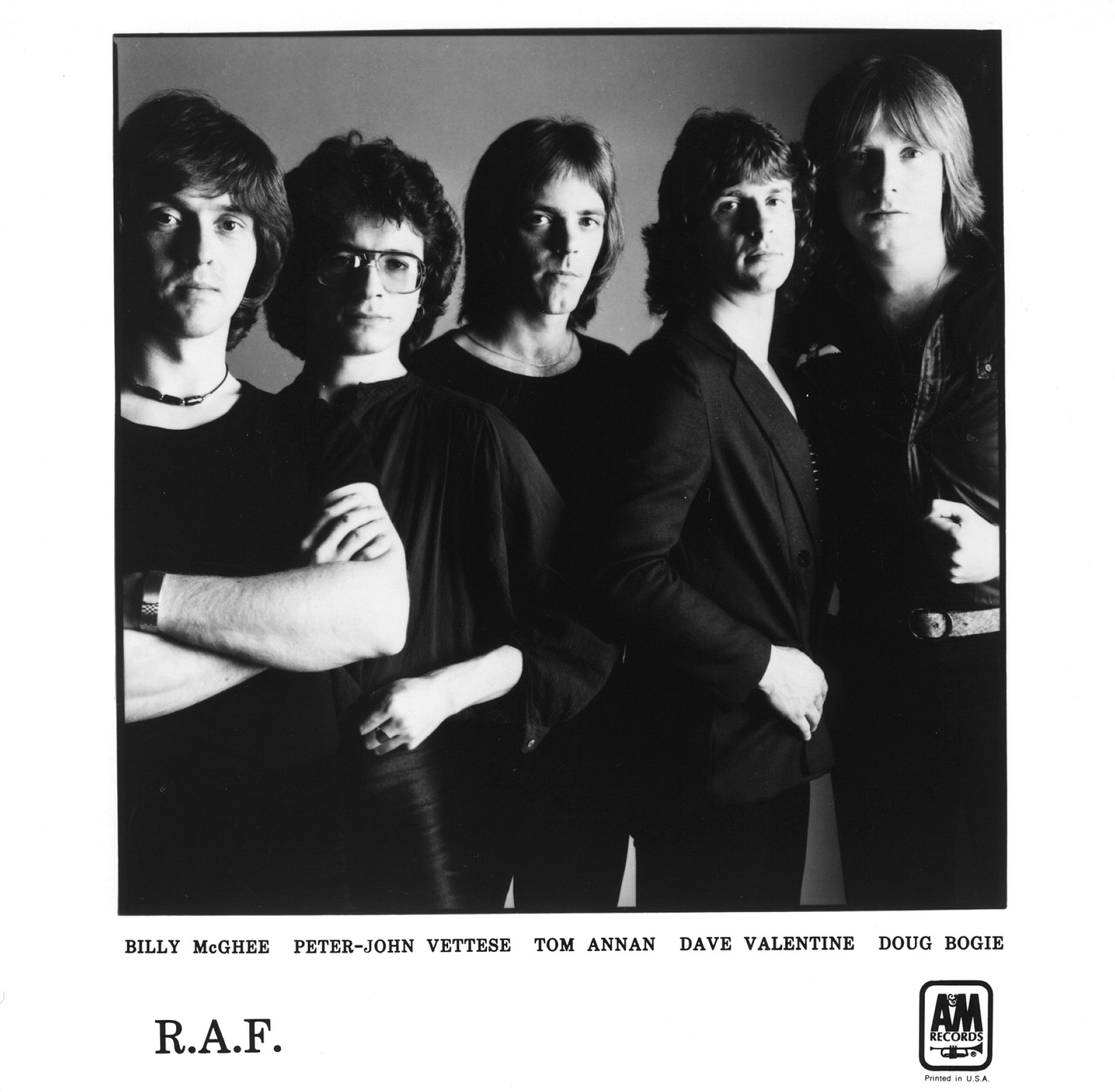
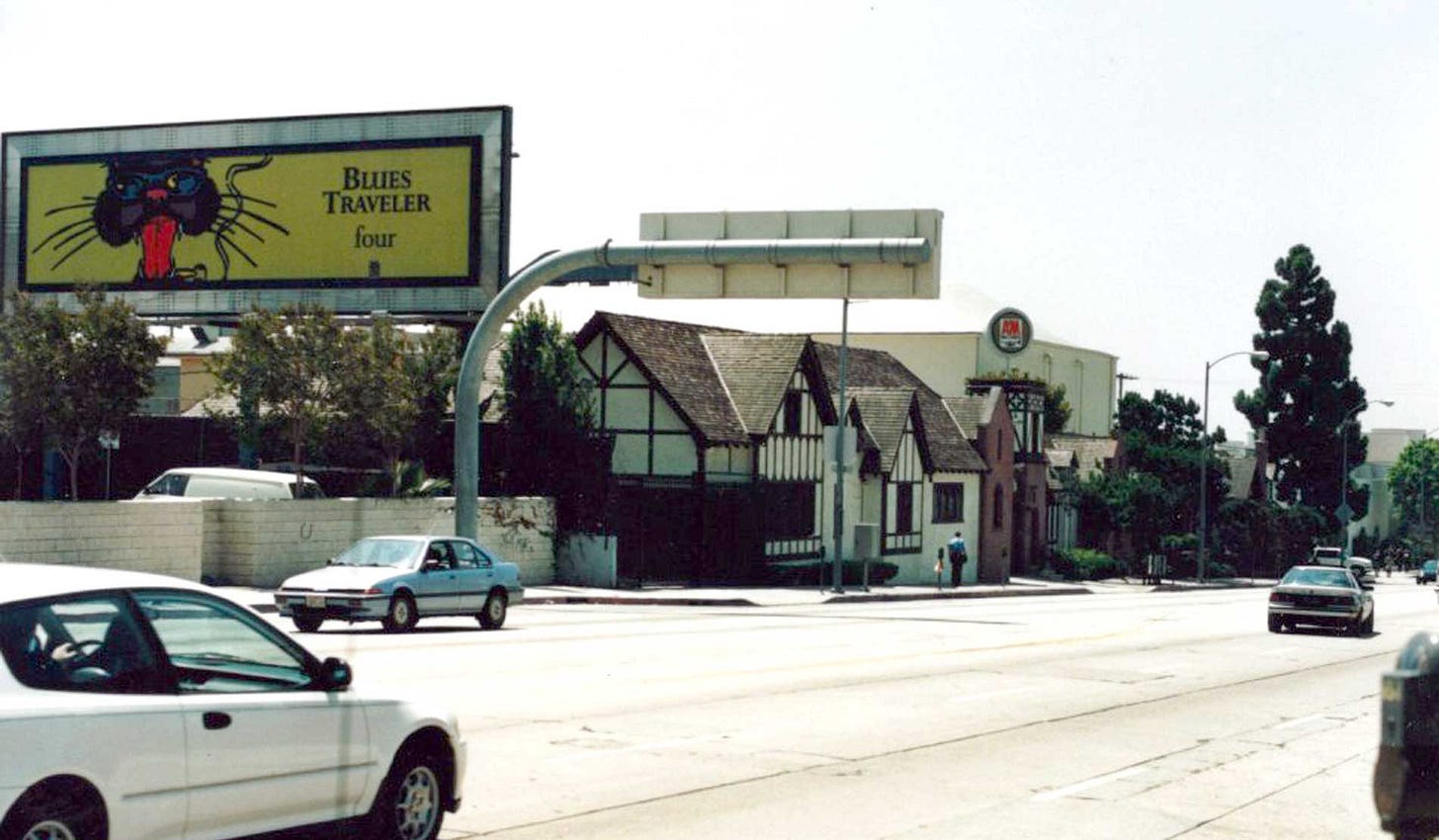
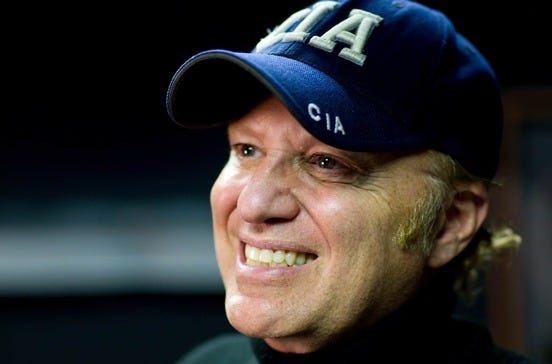
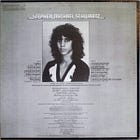

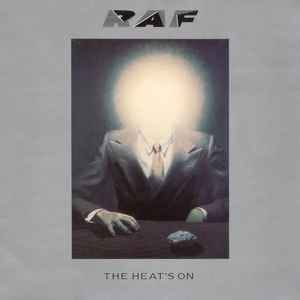
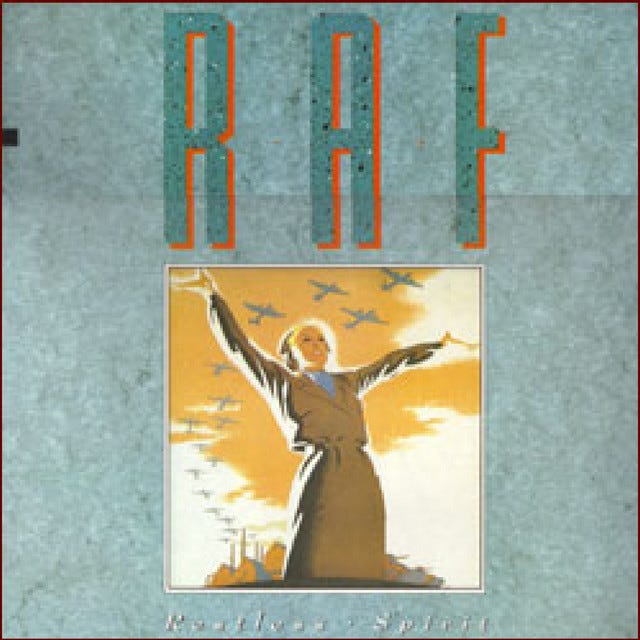
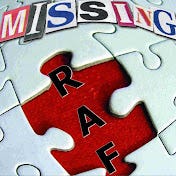
Another great discovery Brad. I had never heard of them.
Just found this article through Notes. Some great songs here! One of those potential winners that just fell through the cracks. A shame.